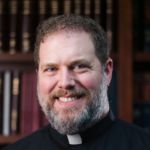
“My power is made perfect in weakness.”
I do not know what St. Paul’s “thorn in the flesh” was. There has been much speculation on that over the centuries, but the image is powerful exactly because he does not tell us what it is: we all know what it is, on a personal level, because we know what it is like to experience some kind of invisible pain or struggle that serves no obvious purpose except to remind us that we are not the masters of our own lives.
Our Lord, in today’s Gospel, experiences a very different kind of weakness: the weakness of familiarity, of home. If this is a difficult concept, let me help with some analogies. The brilliant student who wows teachers and inspires peers goes home only to be asked to help with the dishes. The professional’s business success and skill does not immediately translate into the ability to wow his own children. The artist’s work thrills the heart of strangers, but she finds in her own hometown only confusion and misunderstanding. The skilled surgeon saves lives every day, but his grandmother refuses to value any skill but a well-made biscuit. Poor comparisons with our Lord, perhaps, but part of real human experience—maybe more so than ever in our age of constant transience.
Jesus marvels over the lack of faith in his hometown. But in the eyes of the Gospel writers, this is yet one more example of his humility. He doesn’t need to perform great signs and wonders. Those are for the people’s benefit. He can work miracles, but he will not interfere with the natural order of human will. His power is there, but it cannot be shown, because people do not want to see it.
This moment is characteristic, in a way, because it shows how, ultimately, Jesus’ ministry is much more than healing the sick and performing miracles. On the cross, he embodies, he displays, in a concrete way, Paul’s principle of power through weakness. Because the world is Nazareth, in the end. It lacks faith. It isn’t interested in salvation or healing. And so our God shows us, in his own weakness, the absolute extent of his power. For the early Christians to go around proclaiming “Jesus is Lord” was to state an absurdity: that a crucified man was somehow in charge. But it was only because of his death and resurrection that they understood the full extent of his lordship, his divinity.
I recently finished my third year as a Catholic priest. Almost exactly three years ago, I distinctly remember finding myself—completely unexpectedly—in the confessional for the first time. After an hour or so of hearing confessions, I walked out with a kind of spiritual and emotional high. And that wasn’t because I felt the awesome power of absolution; it was because I was seeing God’s power at work in the lives of the faithful. It was so beautiful! For Catholics, this really is the place where we discover that God’s power is made perfect in weakness. There’s nothing weaker, more vulnerable, than laying out your sins in the open. And to be released from them is a moment of freedom and power: a kind of power that simply is not available to us in any other way.
Speaking of freedom, a belated happy Fourth of July. It is a worthy thing to celebrate our nation and its goods. Though these last few years have been difficult for many reasons, this remains in so many ways a good place to be, and we can be grateful to be in one of the most prosperous and free nations of history.
But I do want to speak a certain caution: do not confuse the popular American concept of freedom and independence with the Catholic concept of liberty. American freedom, as in all modern liberal versions of freedom, assumes that the individual is most free when he has the fewest restraints. But the classical Christian understanding of freedom insists that freedom is not merely the ability to do what one wants; it is, rather, the freedom to do the good. Freedom to kill the innocent, freedom to redefine nature, freedom to profit from others’ suffering, freedom to create our own concept of good and evil—these are not true freedom, but a kind of diabolical parody of freedom. We can celebrate the freedom from the tyranny of King George III, but God forbid that we replace it with another tyranny, however good it may sound.
“My power is made perfect in weakness.” God’s power is revealed in the world, not through some kind of conquest of human institutions in which we realize God’s kingdom in the here and now. It is revealed through weakness, through giving up the need to control destiny, political or otherwise.
If we want God’s power to work for us, whether as a nation or as individuals, there’s no option but the humble one, no way to glory except through the cross of Christ.



